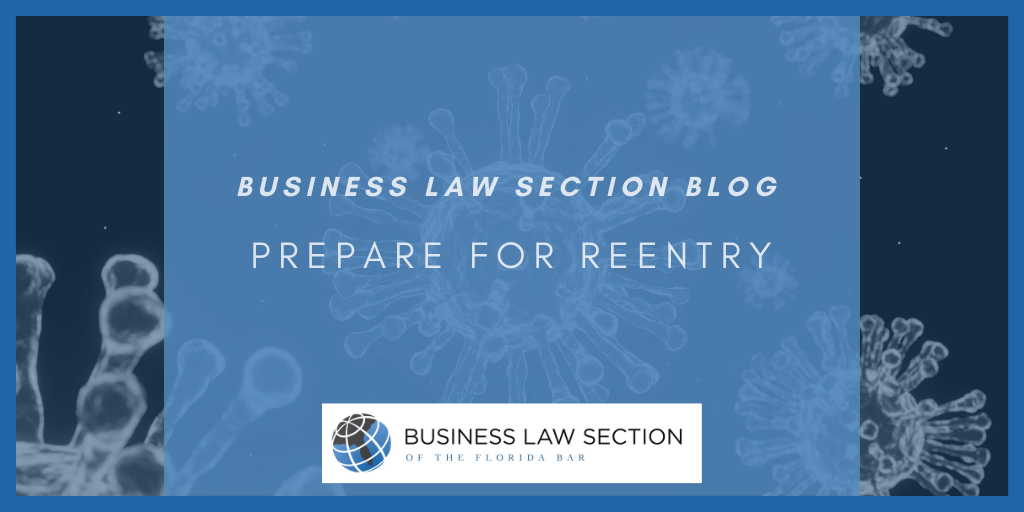By Dineen Pashoukos Wasylik, DPW Legal
Prepare for Reentry
We are now a little over a year into the COVID-19 pandemic crisis. With the end of the school year on the horizon and about 50% Floridians 16 and over vaccinated as of the first week of May, 2021, and more to come, many of us are feeling like we just got used to the “new normal” – will we be going back to the old normal? Will things ever be “normal” again? If you are finding the thought of returning to pre-COVID activities to be difficult, you are not alone. Doctors are calling it “reentry anxiety.”
As one psychologist has explained, anxiety comes from having difficulty tolerating uncertainty and fear of the unknown. 1 The process of letting one’s guard down to “re-enter” post-pandemic life is an “iterative process that leaves a lot of people in a state of uncertainty, and then they’re trying to make an informed decision based on their level of risk.” 2 Couple that with the fact that lawyers tend to be risk averse people to begin with, and the wide range of risk tolerance among varying populations and even within friend and family groups, and of course reentry is a source of deep anxiety for many. What are some ways to tackle that anxiety, both personally and professionally? Here’s some tips, compiled from various mental health professionals, that I hope will be helpful.
Make a post pandemic “bucket list,” Experts recommend building hope by coming up with a list of things you will do as you start getting out and about more. It can be as simple as getting a manicure or haircut, taking care of “deferred maintenance” by re-scheduling missed doctor’s appointments, or as elaborate as traveling once you feel safe doing so. Start making plans to follow through on the list: having the plan will both give you time to get used to the idea, and give you something to which you can look forward.
Reintroduce activities slowly. Now that you have your list of what you want to do, do it! But not all at once. Ease into activities by visiting with one friend rather than having a full-on party, or taking a small, drivable weekend jaunt before trying to get on an airplane again. Don’t overcommit right away, but rather work yourself up to your pre-pandemic activity level – if you even want to be quite as busy as you were before. Remember, too, that it is OK to decide you don’t want to bring back all of those activities. Instead, pick and choose what is most important to you, and try each new priority on before adding a new one.
Get outside. One benefit of living in Florida is that until the dead heat of summer, it is a lot easier to spend time outdoors than in other parts of the country. And even in summer, access to beaches and pools and fresh air is more available to us than elsewhere. If you have not left your house much, try getting out for walks (particularly in the early morning or late evening) to just get used to being out and about. Consider meeting friends at a restaurant with outdoor seating for a start, if you have not already. Working on movement will also help release physical the physical stress from being hunched over a computer all day.
Focus on things you can control. Since uncertainty is a driving factor for anxiety, figuring out the things you can control can help you alleviate anxiety as you are moving forward. You can control where you go, whether or not you want to still wear a mask, whether or not you are vaccinated, and how often you wash your hands, for starters.
Communicate expectations clearly with clients and colleagues. A big source of stress in this transition period is varying expectations of clients and opposing counsel and judges. Should the deposition be in person? Should we have our meeting in person? What about that hearing? Communication is going to be key on such matters. Be honest with yourself about what you feel comfortable with, and in turn, with those you are working with. And try to be understanding of others’ risk tolerance, even when it is lower than yours. As eager as you may be to have that deposition in person, consider doing it further out or by Zoom if the other side requests it. These courtesies will reduce friction. And when you can’t control where the meeting is, see the previous tip: focus on what you can control.
Quit Doomscrolling. Yes, it is important to stay informed about what is going on in the world. But be observational about your process for doing so. Are you wandering to news sites or social media in a never ending circle? Turn off the TV and step away from the phone when you find your time consuming media to be counterproductive. This applies equally to escapist patterns, too: If you wander onto TikTok and find an hour has passed as you’ve mindlessly scrolled, it may be that you are looking to escape. Set timers or use limiting technology if you need a little assist to break the habit. Set timers for better habits, too – I set a 15 minute timer for reading an actual book most days, for example. It helps break the doomscroll cycle (and I often end up reading for more than 15 minutes!).
Meditate. There are many ways to mediate, but they all have one thing in common: meditation is exercise for your brain that helps you focus your thoughts and control anxiety. If you are religious, your religious tradition almost certainly has some form of meditation through prayer, even if it is not called “meditation.” It may bring you comfort to use those tools. If you are not religious, you can still benefit from meditation, in any of its many forms. You can find guided meditation programs for free on YouTube, for example. There are many phone-based apps for meditation, such as Headspace and Calm, that offer a variety of meditation scripts and techniques. If you would prefer self-guided meditation, there are plenty of simple techniques for mindful breathing and focus that you can read up on and incorporate into your life. And your meditation practice need not be time consuming: As my friend and lawyer meditation coach Jeena Cho says, “just take .1 for yourself.” 3 You will find that even a minute of meditation feels long at first, and you may need to work up to six full minutes. That’s fine. Take the time to find that .1 for yourself. You will be glad you did.
Journal. The notion of journaling may bring up images of tween girls with locked diaries and purple pens. But there is a reason journaling helps teens work through their angst, and journaling can be a wonderful tool for coping with stress for adults, too. Like meditation, it is a way to focus your thoughts, and has been shown to reduce anxiety and stress significantly. 4 And there are so many ways to do it successfully. You can set a timer, and just write whatever comes to mind for a period of time. You could follow a system, such as Bullet Journaling, to help you plan your days. 5 Or use a prompt-based journal, which may offer the same or different prompts from day to day. I personally like the Five Minute Journal, which has the same prompt daily: In the morning, list 3 things you are grateful for, 3 things that would make your day great, and an affirmation for the day. At night, jot down 3 good things that happened today, and one idea of how you could have improved your day. That’s it. That focus on gratitude has been shown to significantly improve mood and coping. And five minutes – that’s even less than .1. So you have nothing to lose by giving it a try.
Be kind to yourself. Reentry anxiety is accompanied by an influx of powerful and sometimes conflicting emotions. From moment to moment, you may careen from excited to be social, to nervous about the consequences, to guilty for taking a perceived risk, to upset about a COVID-related loss. Be observational about these feelings and allow yourself to be accepting of the roller coaster. Self-compassion will go a long way toward healing.
Ask for help. If you feel like reentry anxiety is keeping you from functioning, don’t be afraid to reach out for help. This can be from a colleague or friend, or from a professional: remember, the Florida Bar has a mental health helpline, 833-351-9355, and a host of CLE and related resources on coping at https://www.floridabar.org/member/healthandwellnesscenter/. You are not alone.
Dineen Pashoukos Wasylik is the Business Law Section’s Health and Wellness Co-Chair and a member of the Executive Council. An earlier version of this article was published in the May-June issue of the Hillsborough County Bar Association’s Lawyer Magazine.
1 Reentry Anxiety: How to Handle Resuming In-Person Activities During a Pandemic, Penn Medicine News (Oct 1, 2020), available at https://www.pennmedicine.org/news/news-blog/2020/september/reentry-anxiety (visited April 25, 2021).
2 Id.
3 Jeena Cho and Karen Gifford, The Anxious Lawyer: An 8-Week Guide to a Joyful and Satisfying Law Practice Through Mindfulness and Meditation (2016).
4 Emotional Health: Take Note, available at https://www.nm.org/healthbeat/healthy-tips/emotional-health/take-note (last visited April 25, 2021).
5 https://bulletjournal.com/pages/learn (last visited April 25, 2021).


